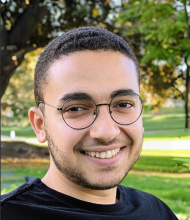MAE 298: On Certain Foundational Issues in Feedback Theory

McDonnell Douglas Engineering Auditorium (MDEA)
Mahmoud Abdelgalil, Ph.D.
Postdoctoral Scholar
UC San Diego
Abstract: The remarkable success of closed-loop control in mitigating the adverse effects of uncertainty on a system’s performance has undoubtedly enabled much of the technological world around us.
Invariably, feedback regulation is ubiquitous and can be found under the hood in the functioning of engines, the workings of biological organisms, interplanetary navigation, GPS tracking, robotics and
more. From its modest beginning during WWII years to the pivotal role of feedback control and Kalman filtering in the Apollo program that brought us to the moon, modern feedback theory has made great strides and is an important topic in graduate curricula. At the heart of the theory is the concept of controllability, that is, the quantitative assessment of the ability to control a dynamical system with the available control inputs. This talk will center on certain foundational questions in feedback theory that pertain to the simultaneous controllability of a collection of systems that remained unanswered until our recent work. In this, a main object of study is the Liouville (continuity) equation -- the PDE governing the evolution of the probability distribution of the state of a dynamical system. While it was widely believed that the basic question of controllability of the Liouville equation had been resolved, it escaped the community’s attention for almost two decades that early investigations on the subject came short of providing a satisfactory answer. In the talk, we revisit and address this topic and develop a theory for Collective Steering, the endeavor to shepherd an ensemble of dynamical systems between desired configurations using a common feedback law. Our investigation sheds light on a topological obstruction at the heart of the issue, that limits our ability to design continuous feedback control laws. Along the way, we touch upon an elegant geometric framework at the intersection of optimal transport, geometric hydrodynamics and quantum mechanics.
Invariably, feedback regulation is ubiquitous and can be found under the hood in the functioning of engines, the workings of biological organisms, interplanetary navigation, GPS tracking, robotics and
more. From its modest beginning during WWII years to the pivotal role of feedback control and Kalman filtering in the Apollo program that brought us to the moon, modern feedback theory has made great strides and is an important topic in graduate curricula. At the heart of the theory is the concept of controllability, that is, the quantitative assessment of the ability to control a dynamical system with the available control inputs. This talk will center on certain foundational questions in feedback theory that pertain to the simultaneous controllability of a collection of systems that remained unanswered until our recent work. In this, a main object of study is the Liouville (continuity) equation -- the PDE governing the evolution of the probability distribution of the state of a dynamical system. While it was widely believed that the basic question of controllability of the Liouville equation had been resolved, it escaped the community’s attention for almost two decades that early investigations on the subject came short of providing a satisfactory answer. In the talk, we revisit and address this topic and develop a theory for Collective Steering, the endeavor to shepherd an ensemble of dynamical systems between desired configurations using a common feedback law. Our investigation sheds light on a topological obstruction at the heart of the issue, that limits our ability to design continuous feedback control laws. Along the way, we touch upon an elegant geometric framework at the intersection of optimal transport, geometric hydrodynamics and quantum mechanics.
Bio: Mahmoud Abdelgalil received his bachelor's degree in aerospace and aeronautical engineering from Zewail University, Egypt, in 2018, and his master's degree and doctorate in mechanical and aerospace engineering in 2020 and 2023, from UC Irvine. He is a recipient of the Holmes Endowed fellowship at UCI and awardee of the 2023 ACC Best Student Paper. He is currently a postdoctoral scholar in electrical and computer engineering at UC San Diego.
Share
Upcoming Events
-
MSE 298 Seminar: Electrocatalysis as Enabling Technology for Decarbonization
-
CEE Ph.D. Defense Announcement: Modeling the Spatiotemporal Heterogeneities of Electric Vehicle Adoption in the United States through Sentiment-Mediated Mechanisms - A Large Language Model-Assisted Data-Fusion Framework
-
EECS Seminar: Random Thoughts After More Than 60 years in the Trenches
-
MAE 298 Seminar: Machine Learning Acceleration of Turbulent Combustion and Nonequilibrium Flow Predictions
-
CBE 298: Green Steel: Design, Supply Chain, H2 Storage and Dispatch Strategies
